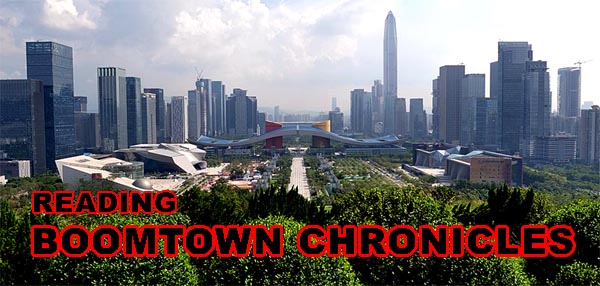 |
| Shenzhen, the Boomtown (Wikipedia) |
Note: Between Lesson #01-128 and #01-207, I wrote 72 lessons explaining expressions in articles published in the Shenzhen Daily. Read more about "Reading Boomtown Chronicles."
Get Ready: Do you think being a farmer is a respectable position in society?
Boomtown Chronicles Part XII - published Monday, September 1, 2008
- Title: " The bricklayers of the 'World Factory'"
bricklayer: a manual laborer who builds walls and buildings of brick. So, as the article tells us about the first laborers to work in Shenzhen's factories, the "bricklayers" are an apt metaphor, since they "built" "the world's factory."
the world's factory: a well-known nickname for Southern China in general, and Shenzhen in particular, since it manufactures a large percentage of the world's goods.
- "Farmers" "unwittingly became one of the first groups of farmers-turned-workers..."
farmers: usually, people who raise food. But the word presents some difficulties in translation. The same Chinese word, nong fu, can be translated both "farmer" and "peasant." A "peasant" is "a small farmer or farm laborer of low social rank." The connotation in English is not good: it implies one who is unsophisticated, uneducated, even ill-mannered ("Don't act like such a peasant!") Anyway, many of the first laborers in Shenzhen were indeed nong fu, and were usually understood to have come from the lowest socio-economic class.
On the other hand, a "farmer" can be quite wealthy and cultured. George Washington was a "gentleman farmer"; so was Thomas Jefferson, and even, more recently, Jimmy Carter. So when I say these men were "farmers," a Chinese speaker of English may get a very different picture from mine!
unwittingly: without knowing something. "Wit" is often used to mean "cleverness." A "witty" person is clever in a funny way. But at its root (related to the word "wise"), the Old English verb form witan means "to know." (It's even related to the Latin videre, "to see," from which we get the word "video.")
The article says that the first workers didn't know that the boom was happening (like a fish may not be aware of the water it is swimming in). It implies nothing about their cleverness, although some were very clever indeed as they transformed themselves again, into entrepreneurs!
- There was "an influx of foreign investment..."
flux: flow; a state of change. An "influx" is a "flowing in." There is a little-used antonym (word with the opposite meaning), "outflux," as well.
- Those who moved to the city are referred to as "migrants."
migrants: people who move around (migrate). One who migrates into a place is an immigrant ("He immigrated to Australia)." One who migrates out is an emigrant (She emigrated from France)." These days, people often use "immigrate" for either: "She immigrated from France" is technically incorrect, but usually accepted.
--------
Read more: https://en.wikipedia.org/wiki/Shenzhen
Practice: Choose the correct term to fill in the blank in the sentence below:
- bricklayer
- farmers
- flux
- migrants
- unwittingly
- the world's factory
- The contractor hired a ________ to build the walls.
- If it weren't for the ________, we'd have nothing to eat!
- It's easier to get a job in "________" than in a small town in the countryside.
- The quality of delivery services has been in ________ since the start of the pandemic.
- The ports began to fill up with ________ when famine hit the country.
- When he fell against the wall, he ________ hit the switch and turned on the light outside.
Answers are in the first comment below.
Submitted to the Shenzhen Daily for September 8, 2008


Answers to the Practice: 1. a; 2. b; 3. d; 4. e; 5. f; 6. c
ReplyDelete